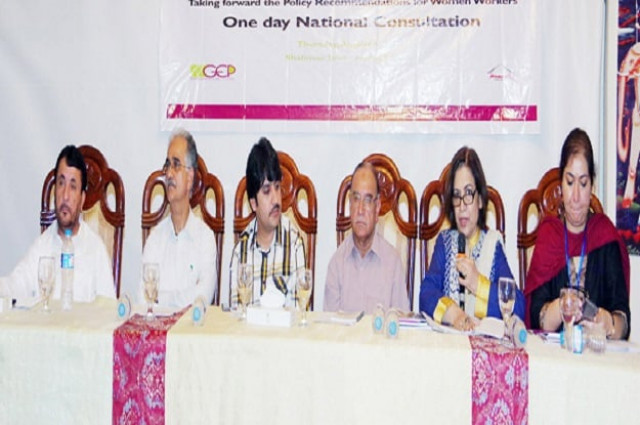Working women: Policies pile up, but when will they be implemented?
Consultation held to discuss recommendations for the uplift of women workers

Consultation held to discuss recommendations for the uplift of women workers. PHOTO: NNI
Most employers are loath to share their profits with workers and most politicians choose not to estrange the business community or the industrialists, Irfan Mufti, of the South Asia Partnership-Pakistan, said on Thursday. “That is why politicians don’t move for higher wages or perks for workers who remain deprived and underpaid.”
He was speaking at a consultation organised by the HomeNet Pakistan and Aurat Foundation to discuss policy recommendations to improve working conditions for women. The event was sponsored under the USAID’s Gender Equity Programme. Representatives of the Labour Departments in Sindh, Balochistan and Khyber Pakhtunkhwa and a representative of the Women Development Department also attended the event.
Mufti said policymakers were, for the most part, aware of the problems of the working class, but had to work within political constraints.
Balochistan Additional Labour Secretary Gul Muhammad said the department was willing to support women workers, especially those working in the informal sector. He said the department had the manpower and expertise to carry out a survey of home-based workers, but they did not have the financial resources to do so. He said they had set up a task force to draft a policy for workers in the informal sector.
Sindh Labour Director Gulfam Nabi Memon said that they already had a policy draft for home-based workers and were waiting for the Sindh Assembly to approve it. He said they had also extended the right of association to workers in the agriculture and fisheries sectors. Memon said they had made a policy for trade unions seeking registration to have the same percentage of women members as were employed in the factory.
Punjab Women Development Department (WDD) Secretary Aamina Imam told participants that the Punjab had the lead in implementing initiatives for the improvement of working women’s conditions.
Provincial Ombudsman Farkhanda Waseem Afzal said most women workers were not aware of forums for redress on complaints regarding sexual harassment at the workplace. She discussed the law on sexual harassment in the workplace and explained various means of redress for victims. However, she said, that the law did not cover women working in the informal sector since it only applied to registered organisations.
HomeNet Pakistan Executive Director Ume Laila Azhar said there had been positive developments over the years. However, she said, it was time for the WDD to implement the policies which, till now, are still on paper. She suggested setting up Day Care Centres for women workers close to their homes as well as skills development facilities for them. Laila said the law pertaining to sexual harassment should be amended to cover women workers in the informal sector as well.
The event concluded with a launch of the Women Workers’ Forum and presentation of Charter of Demands and Labour Legislative Agenda.
Published in The Express Tribune, August 7th, 2015.



















COMMENTS
Comments are moderated and generally will be posted if they are on-topic and not abusive.
For more information, please see our Comments FAQ